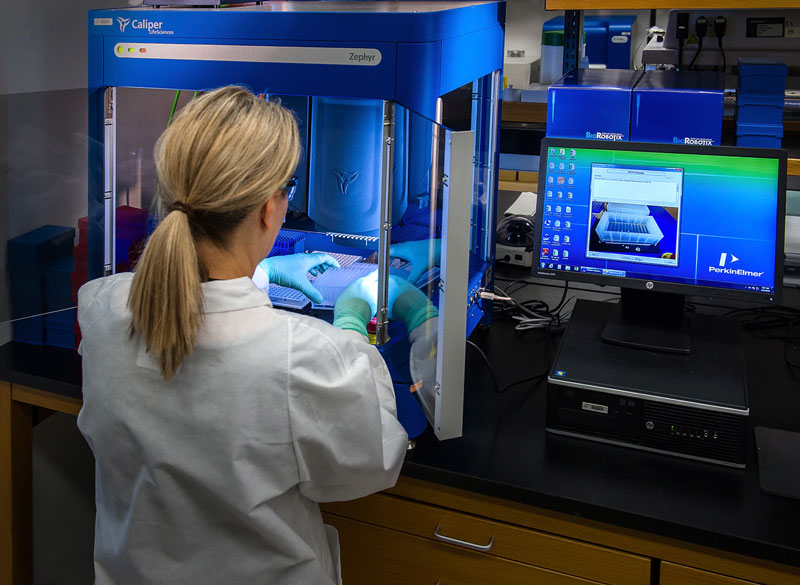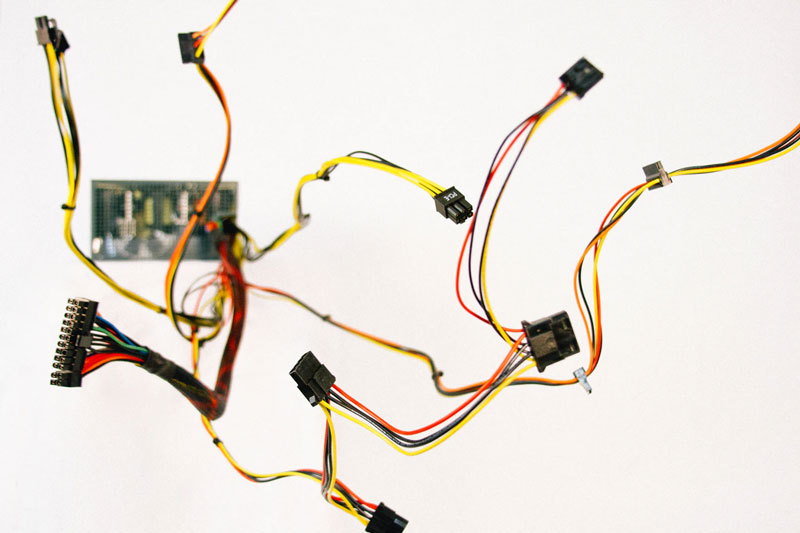Coronavirus and Tech Infrastructures: How Will It Affect You?
Mar 31, 2020

Coronavirus, or COVID-19, has had an impact on individuals, on workers, and on the technological infrastructures in many businesses. Find out more about the coronavirus impact on the economy and learn what it means for the future of your tech-reliant company.
General Effects of COVID-19 on the Economy

Before examining how coronavirus has changed tech infrastructures, it’s important to look at the broad picture. COVID-19 has caused the economy to slow down and has forced some businesses to close.
One of the problems is the coronavirus impact on the supply chain. Because many U.S businesses rely on China for their parts and materials, manufacturers don’t have access to what they need. This heightens the coronavirus impact on the economy. Even if certain businesses have managed to remain in operation, it’s unlikely they will be able to continue conducting operations.
Tech-based companies like Apple are particularly affected. For one, they don’t have the materials they need to produce iPhones. Another issue is a decreased product demand. With fewer people shopping and more people saving money, Apple’s revenue has decreased. Other companies are experiencing a similar situation, compounding the coronavirus impact on the economy. Creative businesses and start-ups are suffering.
What Tech-Focused Industries Have Been the Most Impacted?
In this day and age, almost every industry relies on tech infrastructures. Some industries depend heavily on tech infrastructures, and as a result, those businesses are more affected by the coronavirus impact.
The following industries have tech infrastructures that have already seen the coronavirus impact on the economy first-hand.
Casinos

With most casinos being closed, businesses are losing money. It’s estimated that eight weeks of closure will result in a loss of U.S. spending that values $21.3 billion. While casino workers will lose about $59 billion, casinos themselves will also lose billions of dollars in revenue.
Although big casinos are suffering, online gambling and gaming platforms are still thriving. Their tech platforms need to be equipped to handle the increase in interest. While people are stuck at home and unable to go to casinos, they are relying on online platforms to meet their gambling needs.
Another reason for the increase in online gambling is more people are working and learning from home. At the workplace, such platforms are usually off-limits. But at home, people are free. In a way, they’re limiting the negative coronavirus impact on the supply chain and coronavirus impact on the economy.
Digital Signage

With most stores and restaurants closed for business, you might expect that the digital signage industry is suffering. But this is not the case. During this time, digital signs are providing comfort to people.
While the doors of some businesses are closed, owners can send positive messages through digital signs. They’re also able to share information regarding their business, as well as spread news stories. Digital signs are bringing people closer together in a time when social distancing is keeping people apart.
Signs are also used to keep employees safe. For instance, some workplaces use digital signs as a way of reminding employees to wash their hands or maintain a certain distance from others. As the CDC recommendations change, the signs can change.
Education

Schools are closed, but that doesn’t mean learning has stopped. A switch to virtual education has led to a huge boom in educational technology. Although not everyone is excited about online education, tech platforms have a lot to look forward to. The coronavirus impact on the economy has influenced education technology in beneficial ways.
Two companies have seen a huge increase in demand. Both Zoom and Outschool make live online classes a possibility. Instead of taking advantage of the situation, they have donated money to make their classes more accessible to students. Other education companies have followed suit.
Even though those companies have not tried to capitalize on the disaster, they have increased their demand for technological infrastructure. The coronavirus impact on the supply chain has little bearing on this industry. Despite the coronavirus hurting many businesses, it has boosted tech infrastructure for educational platforms.
Fleet Vehicles

Although there are fewer cars on the road during lockdowns and social distancing, there are more fleet vehicles. This has increased the demand for logistics technology and put more pressure to increase the efficiency of the operations. As a result, the fleet vehicle industry has not been devastated by the coronavirus impact on the economy, just challenged by the increased demand.
More trucks and drivers are needed to provide emergency relief. In fact, the Federal Motor Carrier Safety Administration has issued an emergency declaration. They are giving regulatory relief to commercial vehicle drivers who are transporting emergency supplies. This includes:
- Medical supplies
- Medical equipment
- Hand sanitizer
- Soap
- Food
With the coronavirus impact on the supply chain making it difficult for medical facilities to source masks, gloves, and other essential equipment, transportation of the equipment we do have is more important than ever.
The relief is also available for fleet drivers who transport medical personnel who are essential to controlling the virus. Needless to say, the fleet industry is struggling to keep up with the new demands. There’s an increased reliance on tech infrastructure to support the demand.
Government

Recent advances in technology have made it easier for the government to control COVID-19. One way the coronavirus impact on the economy has changed things is to increase the need for funding of certain technological programs. For instance, the government and the tech industry have been discussing ways in which smartphone location data may slow the spread of the virus. The data could be used to track the spread of COVID-19, as well as show how social distancing affects the spread.
The government also needs to use more of their own technological resources to deal with the virus. Across the country, emergency operation centers are in full swing. From tracking the impact on the supply chain to managing relief resources, the government increased its dependence on technological infrastructure.
As COVID-19 continues to pose a threat to the country, there’s another threat that’s also affecting the government. Cyberattacks are on the rise, so the government is playing defense. Earlier in March, hackers attempted to break into the World Health Organization. Now, cybersecurity is more important than ever.
Healthcare

In some countries the healthcare system was not prepared to handle the large influx of patients. A lack of beds, medical equipment, and tech infrastructure contributed to this. In the U.S., the healthcare industry is facing similar challenges. But healthcare technology is actually helping medical professionals overcome some of those obstacles. In some ways, it's limiting the spread of COVID-19. It’s also helping overcome shortages from the coronavirus impact on the supply chain.
There are several ways healthcare and technology have come together during this time:
Telehealth Replaces Doctor Visits

As doctor’s offices are flooded with patients questioning whether or not they have the virus, offices are closing their doors to patients with symptoms not related to the virus. They are also limiting the number of patients in the office at one time.
Of course, that still leaves many individuals with health needs. Telehealth services are allowing those individuals to see a doctor from the comfort of their computer. As a result, the coronavirus impact on the economy is characterized by an increase in communications equipment and video platforms.
Robots are More Involved in Patient Care

When discussing the coronavirus impact on the economy, it’s important to consider robotics. Prior to the coronavirus outbreak, there was already a doctor shortage in some parts of the United States. The virus has turned what was a minor issue into a severe shortage. And while it takes years to get new doctors into the medical profession, there’s an alternative that has influenced the coronavirus impact on the supply chain in terms of the shortage of doctors and in the tech sector.
In some hospitals, robots are providing a helping hand. Providence Regional Medical Center uses a robot to take the vitals of patients. Although it’s only capable of doing basic diagnostic tests, the robot has alleviated some of the load from the shoulders of nurses and doctors. It limits the number of personal interactions, which decreases the chances of the virus spreading.
There are other ways in which robotics can assist with healthcare. In some areas, robots are being used to sterilize rooms and entire facilities.
Software Finds Patterns in the Virus

There are some IT vendors who have been using their software to find patterns regarding the virus and how it spreads. One example is from Epic, the health record software company. They updated a travel screening to include information that could help identify patients who are infected.
With software customized to track the virus, medical professionals will get more guidance. They’ll be more well-equipped to do their job. New and upgraded software is one example of how the coronavirus impact on the economy has improved some industries.
Hospitality

In some ways, the hospitality industry has been hit the hardest by the coronavirus impact on the supply chain and economy. It’s predicted that there will be a drop in hotel occupancy by 30% over the next year.
While hotels can’t do much about their lack of guests, restaurants are able to rely on technology to keep their businesses running. Thanks to online ordering and delivery services, restaurants are able to sell their food even though dining in is prohibited.
Before coronavirus, online food delivery was slated to become a $200 billion industry. The coronavirus impact on the economy may result in the growth of the industry and an increased need for industry tech. In some areas of the country, robots deliver food to customers. There’s no need for human interaction, but there is a need for improved tech infrastructures.
Will Any Good Come of This?
During challenging times, it’s difficult to stay positive. But it’s important to remember that there’s always a bright side. Despite all of the negative effects of the coronavirus impact on the economy, the future isn’t bleak.
For one, certain industries are thriving. As previously mentioned, remote education, digital signage, and online gaming have all seen an increase in demand. Their biggest struggles aren’t in dealing with a lack of customers, but come from dealing with the rapid growth. Business owners in those industries need to work hard to upgrade tech infrastructures, or they will also feel the effects of the coronavirus impact, especially on the supply chain.
Taking the Time to Improve

Businesses can use this time to improve their products, services, and procedures. While you have some downtime, it’s the perfect opportunity to update your technology infrastructure with NUCs from EWC Technologies. If your business is slow, you can take the time to upgrade to a NUC computer. We also offer volume pricing for your business.
Keeping Up with the Changes
Some businesses won’t survive the challenges posed by the coronavirus outbreak. However, others can rise to the challenge and use tech infrastructures to cope with a new world. The coronavirus impact on the economy doesn’t need to be devastating. Adaptability is one of the keys to a successful business, and adapting your technology could be what you need to make it through the coming months.
Here at EWC Technologies, we have what it takes to improve your business’ tech infrastructure. Our products allow you to save money while empowering your business. To learn more, contact us today.


